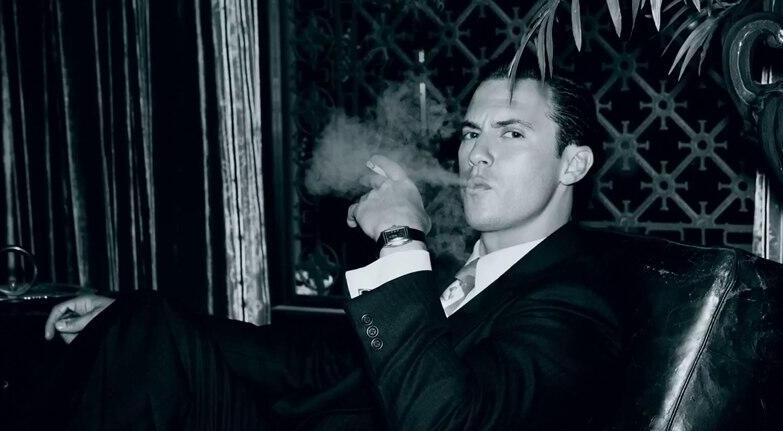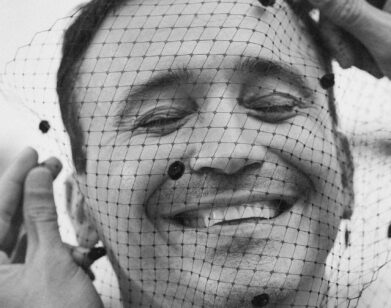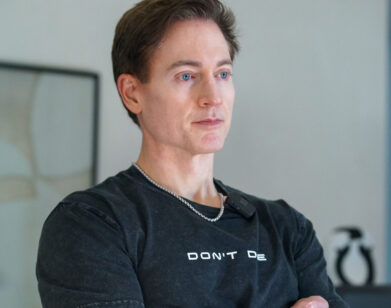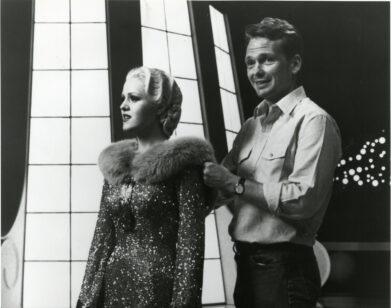Closing in on Milo Ventimiglia

ABOVE: MILO VENTIMIGLIA IN MOB CITY
In the early 2000s, Milo Ventimiglia was the prime cut of teen heartthrobs. After guest stints on television shows (“Party Guest #1” in an episode of The Fresh Prince of Bel Air; “Letterman” in an episode of Sabrina the Teenage Witch), Ventimiglia came to prominence on after-school dramas Gilmore Girls and American Dreams. The actor was able to cruise effortlessly by making the most out of the rebel archetypes of his generation. It wasn’t until NBC’s critically acclaimed drama Heroes that Ventimiglia had the chance to show off his abilities, as both superhero Peter Petrelli and an actor on the rise.
For Ventimiglia, it was a launching pad to explore different areas of his craft. From television, the actor moved to a web series Chosen, and films such as the upcoming Heat, alongside Stanley Tucci and Sofia Vergara, and Grace of Monaco, with Nicole Kidman.
This month, Ventimiglia returns to television in the TNT series Mob City. The actor plays Ned Stax, a fixer and lawyer for Bugsy Siegel (Edward Burns) and his mobsters as they take over the City of Angels. At its finest, Frank Darabont’s (The Walking Dead) Mob City is a luscious, pulpy, epic tale that captures the 1940s like the first sips of a vodka martini. It leaves you wanting more.
Milo Ventimiglia sat down with Interview to discuss what makes a project pop, episodic storytelling, and Mob City.
NIKI CRUZ: What’s the first thing that grabs your attention about a project?
MILO VENTIMIGLIA: For me, it’s usually the character immediately and then the story, and then the people that are involved. With Mob City it went the other way around: it was Frank Darabont, first and foremost, and then it was the setting of L.A. in the 1940s, and then, when I finally got to the character, I thought, “This is all three.” It’s somewhere in the combo of those three things—character, story, and people that I’m going to be working with.
CRUZ: In Mob City, you’re playing the smoothest guy out of everyone.
VENTIMIGLIA: [laughs] One of the first scenes I shot with Frank on the pilot was just a scene of my feet. My face was never seen—it was just my body and movement—and he said to me, “Pal, you’re moving too fast. This guy takes his time.” And I went, “Oh, okay. I got it.” So fast forward to when we shot the series, and you got Jeremy Luke playing a riled-up Mickey Cohen, and that guy is going to explode like a bomb, and I’m looking like I just got laid about four times. It’s a pretty funny dynamic.
CRUZ: In cinema, mob noir stories seem to be a staple—much more so than in television. These days, everyone is excited about the content on television. What do you think Mob City will bring to the medium?
VENTIMIGLIA: Let’s talk about why TV is such a success nowadays. I think TV gives back in a way that features can’t. If you go to a film, you only get two hours of great storytellers and performers, and you pay top dollar for that. If you’re subscribing to premium channels and you’re getting all of these amazing TV shows, and you’re watching them as you want, where you want, when you want, on what you want, I think that is the “the golden era of TV” in what television shows are offering to audiences. We’re giving them a lot more. It’s quality. When we were shooting Mob City, it definitely felt special. Whenever crews are setting up, sometimes you drift back to your trailer, but that was a set I actually sat on while things were being set up just, so I could experience what we were making. It’s been a while since I’ve been on a set where I’ve stuck around.
CRUZ: The aesthetics in the show are very striking. It’s pulpy in the best of ways, and the colors and clothes are bold and almost vulgar. Your character really plays on that old Hollywood glamour. Why do you think we’re still interested in romanticizing these stories decades later?
VENTIMIGLIA: I think it’s very different from what we have now. We’re definitely in a “now” culture with social media and the way that some people are fighting for attention. Back then, the glamour and the style—you couldn’t really make it up. You just were or you weren’t. You either fit in that world or you fit in the other. Things were very cut and dry. Things were simple. There wasn’t a whole lot of excess or flash to be flashy; it was real flash, and real excitement. I think that’s something that always enticed me about the ’40s. I’ve heard stories from my grandparents about when they were younger, and when they were in the war, and they were living in the changing times. There’s something very genuine about that era in humanity and in particularly in the US.
CRUZ: Mickey Cohen and Bugsy Siegel must have had a guy around them like Ned Stax. Did you try to contact anyone that was close to mobsters from another era, like Sammy the Bull or John Gotti?
VENTIMIGLIA: No. It’s understood that Mickey Cohen wasn’t the smartest man and that Bugsy Siegel had an incredible temper, and I imagined that they would need thinkers and guys that kept their cool, and could play chess, and not that immediate checkers game. I was looking at guys more like Sidney Korshak, who was a legendary attorney for the Teamsters and a lot of different unions, and syndicate-type people. I was looking at a guy who was so smart he didn’t even need to write anything down. He just hangs on to all of it and he knows all the angles. I was also trying to understand who these real guys were, whereas my character is completely fictionalized. Frank and I talked a lot about where Ned Stax comes from and why is it that he finds himself in this world.
CRUZ: It’s said that Frank used John Buntin’s book L.A. Noir (2010) as a jumping off point for the series. Did you have a chance to read it?
VENTIMIGLIA: Yeah, it’s really dense! There’s so much information. There was a lot of crime, public corruption, and fighting over the heart of the city, from who was running it to who was in charge. John Buntin really laid it out to understand the historical significance of a city like Los Angeles. It was a great book, but, man, there was a lot of information.
CRUZ: Ned Stax has such an interesting dichotomy about him: he’s a lawyer, so he has all of these ethics that he’s probably learned in law school, but he’s dealing with the mob. Where do you think his moral barometer lies?
VENTIMIGLIA: [laughs] He’s in the middle. He’s 100 percent grey. He’s a guy who has bosses and he also has his own personal feelings, but from what I can gather, he has a lifestyle given to him by people he works for. He’s enjoying the opportunity that he’s given, but he also takes pride in orchestrating what he’s doing.
CRUZ: What do you think his perspective is about the world of organized crime world and the world of the L.A.P.D., which seem to be constantly overlapping?
VENTIMIGLIA: I think he’s a guy that has to have all the angles. He’s working for his boss, so he’s not working both sides. He’s just understanding the quickest means to an end that keeps heat off of his boss. If he was a guy who was morally conflicted but also had the job that he’s in, there’s no way he would last. You kind of have to question where he comes from. He grew up around it, and he understands who these guys are and what they do.
CRUZ: If you had to choose, who would you not want to piss off, Bugsy Siegel or Mickey Cohen?
VENTIMIGLIA: Probably Bugsy. I feel like Ned would be able to talk Mickey down, but I don’t think he would necessarily be able to talk Bugsy down. Bugsy has that perfect combination of violence and intelligence. He’s better off just not pissing either of them off.
CRUZ: Do you think Peter Petrelli could kick their asses?
VENTIMIGLIA: Peter Petrelli was a softie. He was a guy that I know always had a kind of boy-scout mentality towards things. He wasn’t out to hurt anybody even given what he’d seen or what he went through. I’ve definitely been vocal about it, and I’ve said it at comic con panels that, if I were Peter, I would have absolutely killed Sylar. I don’t think they had guys like that in the ’40s.
CRUZ: Lastly, which characters do you think you could connect the most to out of everyone you’ve played?
VENTIMIGLIA: I don’t know. I try to find something in everyone that I play—even the most heinous ones. You have to find something that is real and vulnerable about everything that you play. I did a movie with Jason Statham that comes out next year called Heat, and I play a horrible guy that does horrible things to women, but yet he’s a scared little boy. You have to have sympathy for the villain. Even the most disgusting ones, you have to find something to connect with. I try to put as much of myself in every single character that I play.
MOB CITY PREMIERES THIS WEDNESDAY, DECEMBER 4, ON TNT AT 9/8C.






